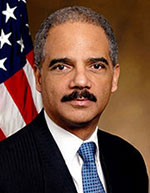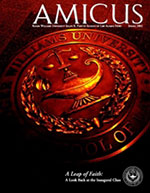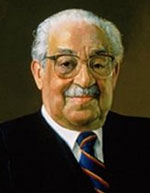2000-2004
“Bristol is a wonderful town, and the campus is just breathtaking in its beauty. That plus the youth of the school, and the energy and optimism I feel here made this a very distinctive challenge and a delightful opportunity. All the signs are good. All the winds are blowing in the right direction.”
~ Dean David A. Logan, 2003
2000
 Dean Rishikof introduces courses in National Security Law and the Constitution, in cooperation with the Naval War College in Newport.
Dean Rishikof introduces courses in National Security Law and the Constitution, in cooperation with the Naval War College in Newport.
2001
Founding Dean and former Roger Williams University President Anthony Santoro rejoins RWU Law as faculty member.
 Eric Holder, then Deputy Attorney General under Janet Reno, delivers the RWU Law’s first Thurgood Marshall Lecture. Mrs. Thurgood Marshall makes her first of several visits to RWU Law for the inaugural lecture.
Eric Holder, then Deputy Attorney General under Janet Reno, delivers the RWU Law’s first Thurgood Marshall Lecture. Mrs. Thurgood Marshall makes her first of several visits to RWU Law for the inaugural lecture.
Honors Program established.
Dean Rishikof steps down, effective June 30. Bruce I. Kogan, formerly Associate Dean for Academic Affairs, appointed Interim Dean effective July 1.
2002
 Amicus Magazine, Vol. 1, No. 1, is published. Amicus had previously existed as a student/alumni-run newsletter. In 2011, the magazine was redesigned and re-titled RWU Law Magazine, with "Amicus" retained as the name of the publication's Alumni department. RWU Law Magazine would publish biannually through 2016, and occasionally thereafter.
Amicus Magazine, Vol. 1, No. 1, is published. Amicus had previously existed as a student/alumni-run newsletter. In 2011, the magazine was redesigned and re-titled RWU Law Magazine, with "Amicus" retained as the name of the publication's Alumni department. RWU Law Magazine would publish biannually through 2016, and occasionally thereafter.
2003
 David A. Logan is appointed Dean, effective July 1. Logan had been a tenured full professor at Wake Forest University School of Law.
David A. Logan is appointed Dean, effective July 1. Logan had been a tenured full professor at Wake Forest University School of Law.
2004
 The Thurgood Marshall Lecture Series becomes RWU Law’s first endowed lectureship, underwritten by leading law firm Hinckley, Allen & Snyder LLP. First topic is the 50th anniversary of Brown v. Board of Education (1954).
The Thurgood Marshall Lecture Series becomes RWU Law’s first endowed lectureship, underwritten by leading law firm Hinckley, Allen & Snyder LLP. First topic is the 50th anniversary of Brown v. Board of Education (1954).
